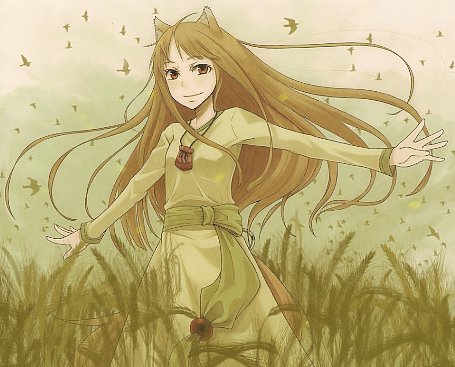
There’s a certain trope that’s quite popular in anime, though not so common in Western TV shows and movies – the abundance of characters who embody animism, with human traits and often human form, but are not human…
I’m sure anyone who’s seen a fair amount of anime can name a number of (quite popular) characters who look like humans and (usually) act like humans, but are actually members of some other group of beings.
I’ve noticed a few different variations of this trope, the most common being the conflict of the character who starts out as strictly a member of whatever group they come from, then slowly starts to develop more human traits as they spend time with characters who are human. Often the character in question started off anti-human, or at least indifferent to humans, but their growing human emotions causes internal strife and friction with their former roots.
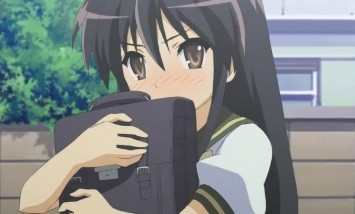
Shana is a good example of one such character. She has a human form but is actually a fantasy being called a Flame Haze. She starts off rather indifferent to humans, but as she spends time with Yuuji, she takes on more human traits that conflict with her status as a Flame Haze.
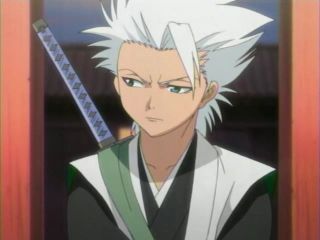
The many shinigami in Bleach, like Hitsugaya, look and act (and bleed) like humans but have powers and abilities that are quite un-human.

Yuki has the complex status of an alien humanoid interface for the Integrated Data Space Entity. Her human form is flawless, and despite being a supposed stoic “communication device” for the IDSE, human emotions have gradually surfaced in her, too.
There are also a number of characters whose human forms retain some evidence of what kind of being they really are.
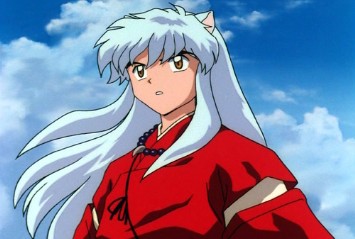
Inuyasha’s dog ears and claws reveal him in his otherwise perfectly human form. His story is one that fits the trope perfectly – starts off as a pretty raw example of his demon side but gradually becomes more akin to his human side by spending time with humans.

Horo’s wolf ears and tail call attention to her status as a supernatural wolf being. But like many other non-human characters with a human form, her human emotions have revealed themselves many times.
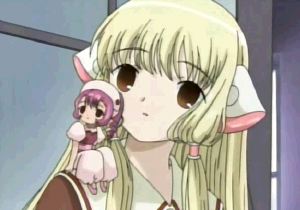
Chi and the other persocoms in Chobits are near perfect examples of a humanoid computer with only the ear pieces giving them away. Again, as the story progresses, Chi gains subsequent human emotions that give rise to conflict.
I think an important contributor to the prevalence of this trope in anime is the animism of Japan’s traditional religion, Shinto. Animism is the idea that souls can exist not just in humans, but in animals, plants, or other natural forms like rocks and trees, or even in intangible forms such as words and concepts. Shintoism embraces this idea with the belief that there are gods and spirits everywhere in the natural, or even the unnatural, world. Anime uses its ability as a fictional medium to expand on this belief and give human souls to all manner of beings.
Animism is further exemplified in the many anime where human traits are given to nonliving objects.
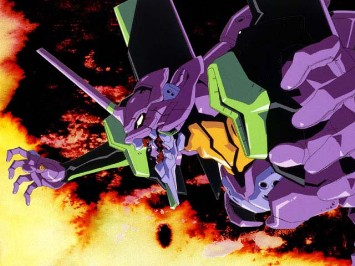
The Evas are only a few of many anime mecha that have exhibited human traits and potential human souls despite being machines.
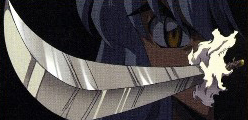
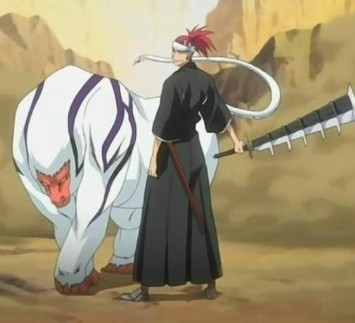
Swords, from Inuyasha’s signature Tetsusaiga to the many zanpakuto in Bleach, have been shown to sometimes have wills of their own, a non-weapon form, and some kind of soul link with their owner.
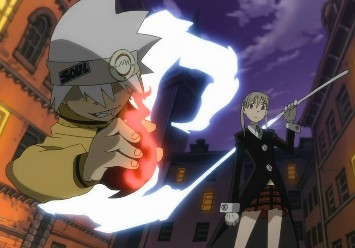
In Soul Eater, the weapons actually have human form and act very much like any human character.
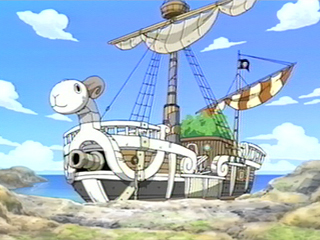
The Going Merry ship on One Piece has been so personified that the Straw Hats consider it one of their comrades and its “funeral” scene was just as tear-jerking as if an actual living thing had died.
I could go on with the list of examples – the Rozen Maiden dolls, the cards in Cardcaptor Sakura and Yu-Gi-Oh!, the spaceships in Tenchi Muyo!, Alphonse Elric in Fullmetal Alchemist – but I’m going to stop here.
So why are these non-human characters with human traits and souls so abundant, and often times so popular, in anime, besides the fact that animism is just a part of Japanese culture? I think it simply boils down to this; the characters are given human traits so viewers can relate to them, but at the same time, they aren’t human, so that in turn makes them more mysterious, unpredictable, and interesting. The “gradually developing human emotions” process for these characters is simply a gratifying and heartwarming journey to follow.
While the idea that souls could exist in all things is commonplace in Japanese forms of media, it’s quite the opposite in the Western beliefs that only human beings posses souls. A few times when an American non-anime fan asked me about certain characters who look human, and I told them that they were actually a demon/spirit/god/weapon, etc., I felt like that fact turned the person off and alienated them from the character rather than piqued their interest. I guess the idea of fantastical non-human characters possessing human traits is not as appealing to the average American, at least to those who are not already interested in fantasy or sci-fi. Western religions often emphasize humans ruling over nature and other beings, while Eastern religions emphasize humans living in harmony with nature. So perhaps the idea of non-humans, from animal gods to trees and rivers, having human traits and thus being equal, or even more powerful than, humans, is an alien idea to most Westerners.
I’ll wrap things up by saying that fangirl/boy love for certain anime characters is itself a form of animism – giving human traits and souls to these characters and loving them as if they were real humans. The way anime presents its characters often fosters these feelings, with its emphasis on character development and/or character-driven situations, and of course, all of the merchandise and fan service scenes available for these characters. The uniqueness of the animism and Shintoism that permeate anime in comparison to the West is at least one contributing factor to anime’s popularity outside Japan.
hmm I thought your last paragraph was interesting
being a fan of any fictional character(s) is sort of like animism
giving souls to animals/characters made of words and ink
I’m sure this happens in Western culture too (Twilight/LotR/HP/SW/etc)
well actually I’m a Star Wars fan too =)
Nice article. I’d never really considered applying Shintoism to anime’s penchant for anthropomorphizing certain characters. I do however wonder about your 2nd to last paragraph. Would the results be different if say it was a religious or non-religious western person.
@ Prooof
Yeah, anyone who knows otaku culture knows how some fans love certain characters as if they were real. This can also be attributed to certain stories/franchises in general, such as Star Wars and the others you mentioned. Most of these are so complex, they’re practically their own universe and it seems reasonable to indulge in them as if they were real.
@ Taka
Maybe it might be different for a non-religious Western person, but Christianity and other Western ideals are so much a part of Western culture in general, it’s hard for people to not have their opinions influenced by them, even if they’re not a religious person. But I think people who like fantasy and sci-fi (whether they’re religious or not) would be more open to the animism in anime. But if you tell the average American, who prefers simple sitcoms and reality TV shows, about the complexity and fantastical aspects of anime stories, they probably won’t get it.
The latest (and endlessly continuing) filler arc in Bleach is all about the zanpakuto, who have been released into human form and brainwashed by an enemy to war against their shinigami wielders. If nothing else, it’s more characters to merchandise for Viz. ;) But I think it also goes to the point about animism that you make here. They’re not “mere” swords, but have souls of their own.
Ghibli films also clearly share the same trait and they are very Eastern in how they deal with spirits/nature. I think the reason Ghibli films can appeal to more Western audience is because they are made for young children.
Inuyasha and Horo kick ass. If I could be any anime character, it would be Inuyasha.
@ Jan
Giving a human form to characters who are animals or objects has been very popular in anime for quite a while, whether by fans only or in the actual canon story. Japan’s fascination with anthropomorphic robots, both in anime and in real life Japan, is yet another example. There’s actually a fan word for the human forms of animals called “gijinka,” derived from the Japanese word for “personification.” All I can say is that it just goes back to the animism in Shintoism and the appeal of giving human traits and souls to all manner of things.
@ Canne
Yeah, Shintoist beliefs – many gods/spirits in nature and human beings living in harmony with nature – are present in almost all the major Ghibli films. I actually think their appeal in the West is because they are so different than anything made in the West, thus (open-minded) Westerners are fascinated by and appreciate them.
When people get turned off by you telling them that Character X is actually not human, I don’t think it’s a matter of different belief systems clashing. This might be judgmental on my part, but I think that non-fans see fans being passionate and devoted to these subjects, and they conclude that we REALLY believe in this stuff. And, I guess from the way we carry on sometimes, it’s not so far from the truth.
@ 2DT
Ah, that’s a good point. I guess people who are not passionate about stuff like this themselves assume that, for fictional stories revolving around detailed, complex fantasy, like so many anime stories, the people who like these stories take them too seriously and are childish for being enamored by that stuff instead of something realistic, and that’s what turns them off. I’ve noticed that there’s a fine line between those who like fantasy and those who prefer realistic settings, like sitcoms for example, at least in America. In most cases, the latter can’t understand the passion of the former and vice versa. What’s weird is that those who indulge in fantasy, whether it’s anime, Harry Potter, Star Wars, etc., are thought of as nerds while those who indulge in realistic things like sports, reality TV, etc., are not. I guess it’s because, in the eyes of general society, reality > fiction.
This is a very interesting article which really got me thinking. I do think that animism in anime can be a way to make money, but agree that there is also the deeper aspect of Japanese culture and religion. It’s so different from American sitcoms, for example, that it becomes unaccepted. I hope that one day fantasy will be something besides ‘nerdy’ in society-who knows, it could happen (maybe).
One thing I would like to point out, Wolf’s Rain is a perfect example of this as well. Wolves taking human forms and the concept of rakuen in general is animism, and Kiba and Toboe’s opposite attitudes towards humans (at least in the beginning for Kiba) match your first points. =)
@ Tori
Yeah, people can be just as obsessed with certain mainstream TV shows, actors or singers, movies, etc., but it’s usually the fantasy things that are considered nerdy to be obsessed with. But I feel like society is getting more open so perhaps in future years this will change.
Wolf’s Rain is a more direct example, as is any TV show or movie with animals acting very human-like. Disney movies obviously come to mind, but the animism in Wolf’s Rain is more extreme because the wolves have human forms, though they act more like animals than Disney animals do.
So what your saying is that watching anime will make us consider/treating them as if they’re real characters. So it’s like sort of idolatry?
But would it be also bad to draw anime? I mean like i don’t treat my drawings as if they are real humans, i just like drawing them.
I know a few and one I espically like watching over and over again Cat Planet Cutties Warning Adult rated. I love the reactions and funny suitations he gets into with Areis.